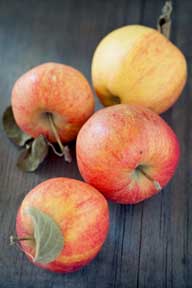Eat the Peel: Apples’ Anti-Cancer Agents Are in the Skin
- By Rebecca North
- Reading Time: 4 mins.
Everyone knows the old adage “an apple a day keeps the doctor away” but research over the last two decades has begun to reveal why that is true: strongly antioxidant polyphenols that reside in the skin.

Polyphenols in apples’ colored skin help protect them from bacteria, viruses, fungi, and the damaging effects of UV-B radiation. Polyphenols are a class of chemicals which act as antioxidants and may protect against frequent health problems and inhibit or prevent cancer growth. Polyphenols fall under “phytonutrients,” a large class of plant-based nutrients that research has found may be critical for human health and wellbeing. Quercetin is one of the apples’ better-known flavonoids, a polyphenol sub-class, which is now also sold as a supplement.
Apples have health benefits far beyond what one would expect: besides providing a good source of fiber and Vitamin C, researchers have found that consuming apples regularly—at least twice a week—helps prevent various cancers, asthma, diabetes, and cardiovascular disease, as well as contributing to weight loss, according to a 2004 Cornell University study summarizing the health benefits of apple phytochemicals. These results stem from both lab work and extensive epidemiological studies in humans. The same paper mentions promising preliminary research into apples’ possible preventative effects for age-related diseases such as Alzheimer’s, macular degeneration, and osteoporosis.
Polyphenols are powerful antioxidants, which act to eliminate damaging free radicals in the body. For example, free radicals oxidize harmless low-density (LDL) cholesterol in the blood, causing it to adhere to the walls of blood vessels, which in turn causes cardiovascular disease. Oxidation also plays a crucial role in causing cells to become cancerous. Some of the polyphenols in apples appear to stop the growth and spread of cancer cells. A 2007 study by Cornell University on the peels of Red Delicious apples found triterpenoids, or chemical compounds, that inhibited or killed cancer cells in the lab. This research showed the apple peels’ reductive effects of lung, colon, breast, and liver cancers.
Health Benefits of Apples
Other research has shown whole apples’ benefits in the following common health problems:
Heart disease
Although an apple’s fiber content is modest, it affects the body as though it were much higher. Scientists do not yet understand the mechanism completely, but the polyphenols and other phytonutrients in apples seem to interact with pectin and other fibers to enhance the fibers’ effect. Not only is digestion improved, but apples measurably decrease levels of bad LDL cholesterol, and elevate levels of good high-density (HDL) cholesterol.
Asthma
Numerous studies have found that both the effects of asthma and the risk of developing asthma are reduced in people who consume apples and/or pears regularly (at least twice a week). Apples also have a protective effect on the pulmonary system of healthy people. Other fruits and vegetables have not shown these effects, which appear to be related to polyphenols in apples, specifically quercetin, hesperetin, and naringenin.

Weight Loss
Interestingly, apples cause people who eat them to feel more satisfied and full, compared with eating the equivalent calories in another form. An apple eaten 15 minutes before a meal causes people to consume 15 percent fewer calories at that meal. As apples are low calorie, this translates into fewer calories consumed overall—about 60 calories less, even taking into account the apple. In a study of overweight Brazilian women on low-calorie diets, the ones who ate apples lost more weight than those consuming the same calories but without apples.
Diabetes
The polyphenols in apples have been shown to prevent Type-2 diabetes, possibly through how they regulate the enzymes that break down complex carbohydrates into sugars in the bloodstream. By inhibiting the enzymes’ effect, the level of sugar in the blood is maintained over longer periods without large spikes in content. The polyphenols also increase insulin production in the pancreas, decrease the amount of glucose absorbed in the intestines, and increase the uptake of glucose from the blood.
Get tips for your office
Be an office hero!Eat it Whole
Apples’ health benefits come from the fresh, whole-fruit form. It is imperative to consume the skin, where much of the apple’s polyphenols, phytonutrients, and soluble fiber are concentrated. Because the skin is so beneficial, buying organic apples without pesticide residue makes sense. Conventional apples generally do have residues from pesticide use. Although apples are kept in cold storage for months after harvest, luckily this does not cause much of a loss in nutrients. Apples lose much of their polyphenol content when cooked, and the little remaining is removed if apples are turned into pasteurized juice.
Expect to hear more about apples in the years to come, and remember that pears are similar in phytonutrient content. We are just beginning to understand how apples, as well as other fruits and veggies, contribute to our health, and additional phytonutrients keep being found. It takes longer to understand how they function to enhance our health, but folk wisdom was there long before the scientists.


